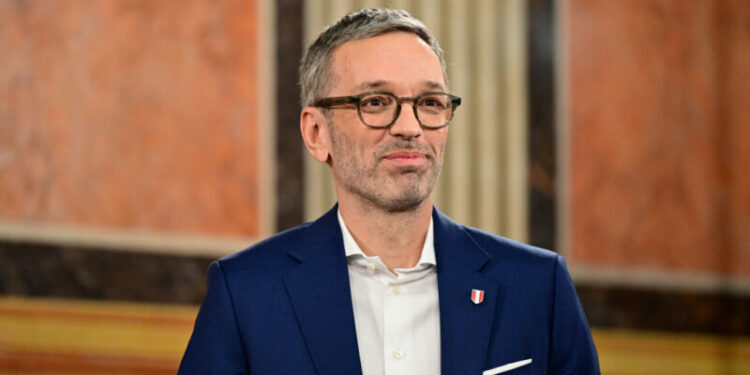I think of the Netherlands and Austria as the bellwethers of European politics. It was in Austria where a hard-right party first entered a government of an EU member state. The Netherlands, meanwhile, is a front-runner in political fragmentation. The Dutch parliament has 15 political parties, with only 150 MPs. Four of those parties are part of the current governing coalition. Today, we have strong hard-right parties and multi-party coalitions across Europe.
The hard-right Freedom Party (FPÖ) won the election in Austria, which was held on 29 September, after a campaign that was more extreme than any previous campaign. Its leader is Herbert Kickl, who differs in style and character from his predecessors. He is athletic and ascetic and, so far at least, scandal-free. His predecessor as FPÖ leader, Heinz-Christian Strache, was forced out after being filmed in Ibiza seeking to strike a dirty deal with a woman who claimed to be a Russian investor.
Kickl may be softer on the outside, but his views are far more extremist than those of your average far-right party. His election manifesto was entitled: “Fortress Austria”. I recall the “Fortress Europe” jokes in the UK that tried to depict the EU as protectionist. For the FPÖ, the idea of a fortress is not a joke, but an aspiration. This party appeals to an electorate that does not seek opportunity but protection – against the world we live in.
Kickl seeks to change Article 1 of the Austrian constitution, which currently defines Austria as a democratic republic, where power rests with the people. The FPÖ wants to add a clause that Austria must protect itself against the EU, the World Health Organisation and the UN’s Intergovernmental Panel on Climate Change (IPCC) – an eclectic choice of organisations, of all which have offended the FPÖ on several occasions. The FPÖ also wants to be able to withdraw citizenship from refugees who fail to integrate, and to introduce an emergency law which suspends the right to asylum, which would constitute a violation of the Geneva convention. The FPÖ wants to abolish laws that penalise right-wing hate speech, exert control over what teachers can say in class, and change the funding structure of the media. Revolutionaries have known since time immemorial that you have to start with the media. To say that the FPÖ’s agenda is not compatible with membership of the EU would be an understatement.
Radicalism is what won Kickl the election but is also the reason why he is unlikely to become chancellor despite coming first with a 29.1 per cent share of the vote. In the Netherlands last year, Geert Wilders’ Party for Freedom also came first, and Wilders also failed to become prime minister for the same reason. This is the price hard-right parties pay for power. In the Netherlands, at least, standing aside has not damaged Wilders’ popularity, or that of his party. I would not be surprised if Kickl did the same. It would allow him to keep on pushing for his agenda without being bound by cabinet responsibility.
It is also possible for the other Austrian parties to form a losers’ coalition. What counts in the world of proportional representation is not whether you come first, but whether you can organise a coalition that has more than 50 per cent of the seats. The centre-right People’s Party, headed by Austria’s current chancellor, Karl Nehammer, could form a coalition with its traditional rival, the Social Democrats. It would be like Labour and the Conservatives, or the Democrats and the Republicans, forming a coalition. In Austria and Germany, such constellations used to be known as grand coalitions: they are not so grand anymore. A tie-up of the two largest centrist parties would have only 93 seats in Austria’s 183 seat parliament, just one seat more than the threshold for a majority. The two could bring in the liberal Neos Party, but this would be an awkward coalition of parties that have different ideas about immigration, the EU and social policy. Keeping the hard-right out of power at all costs has proven costly for many centrist parties in Europe.
When looking at Austria, I am thinking very much of Germany next year. The hard-right Alternative for Germany is not nearly as old and bold as the FPÖ in Austria. It is polling only at around 20 per cent. It, too, is thriving because the other parties have erected political firewalls against it: it will definitely not become a member of a governing coalition after the 2025 elections, but I see the same dynamics at play. When voters are unhappy about immigration and about the state of the economy, they blame the parties that always end up in government. This is how Giorgia Meloni rose to power in Italy; it is why Marine Le Pen’s party is so strong in France.
An interesting phenomenon in German politics that is widely absent in Austria and the Netherlands, is the resurgence of the left. This is where I see Germany as a bellwether for others. I wrote about the phenomenon of Sahra Wagenknecht’s party recently. In the last few days, the Green Party has seen a large number of resignations from the left of the party after its right flank won an inner-party power battle. The centre-left in general is also fragmenting.
The fragmentation of parties reflects that of voters who struggle to identify with the classic themes of the centre-left and the centre-right. I see long-term economic decline and insecurity as the deep causes behind much of the political instability in Europe. My advice to the centrist parties is to accept defeat when defeated, reboot their agendas, and start thinking deeply about economic reform and investment, and how to co-ordinate this across borders.
[See also: Can Labour afford ambitious climate policy?]
Content from our partners
Source link : https://www.newstatesman.com/world/europe/2024/10/hard-right-wins-big-austria-freedom-party
Author :
Publish date : 2024-10-01 05:44:30
Copyright for syndicated content belongs to the linked Source.


